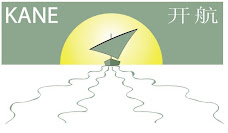I have to admit that I have begun morphing into my father by spending entirely too much time watching C-SPAN. However, in my defense, it is an election year and the banter is neither stoic nor meaningless. Watching Fred Thompson is a pleasure because he has a really deep voice and I always get this sensation that I'm watching a combination of him as District Attorney Arthur Branch on "Law & Order" and White House Chief of Staff Harry Sargent in Clint Eastwood's 1993 thriller, "In the Line of Fire."
What struck me today was that in discussing the freedoms of the US and our constant battle with Islamic fundamentalists, presidential candidate Thompson quickly turned his attention to China and asked the question, "Why are they building up their military so strongly right now?" He then made an astute allusion to Sunzi's "The Art of War" by saying that the Chinese have known for millenia that in order to build a strong military you must first build a strong economy. Indeed, in the second chapter, called "Waging War" (作战), Sunzi starts of by saying "Generally, a war operation requires one thousand light chariots, as many heavy chariots and a hundred thousand armored soldiers with provisions enough to carry them a thousand li. What with the expenses at home and in the field, stipends for the entertainment of state guests and diplomatic envoys, the cost of materials such as glue and lacquer and sums spent for the maintenance of chariots and armour, the total expenditure will amount to one thousand pieces of gold a day. Only after this money is in hand can an army of one hundred thousand men be raised." (Sunzi: The Art of War, Foreign Language Press Beijing, China 2001, Edited and translated into modern Chinese by Wu Rusong and Wu Xianlin, translated into English by Lin Wusun - for the original Chinese, see the end of this posting).
Now, over the last eight years, Donald Rumsfeld repeatedly stated that the Chinese were spending much more than in military armaments than they officially reported, including his visit in late 2005. During that visit, Rumsfeld stated, "'We also approach our relationship realistically...Many countries, for example, have questions about the pace and scope of China's military expansion...A growth in China's power projection understandably leads other nations to question intentions and to adjust their behavior in some fashion." (Associated Press, October 18, 2005)
He is right. There is a lot of money going around China right now and we really have no idea how much of it is being pumped into arms factories. We do know about the military equipment purchases from Russia, we know about their nuclear weapons pointed at Taiwan, however we have very little idea about much else. Moreover, we do see the Shanghai Cooperation Organization;s yearly conference that gathers heads of state from around Central Asia, including Russian President Vladimir Putin, and it is clear that China's influence in that region is growing. Furthermore, China is leading the way in Southeast Asia as well.
So, when Admiral Keating, who just returned from China, said that "We must be more open about its rapid military buildup and should expand military collaboration with the United States to develop greater trust and thereby prevent misunderstandings and confrontation," he means business. The response by his counterpart, General Chen Bingde, chief of general staff of the People's Liberation Army was, ''We don't have the ability to make you afraid of us.'' (January 18th, 2008, by Jim Yardley, The New York Times) Keating's visit came on the heels of a dispute between the US and China around Thanksgiving of last year, when Beijing summarily refused to allow the aircraft carrier Kitty Hawk its scheduled call to Hong Kong. A few days prior to that, China also refused two American minesweepers from Hong Kong due to inclement weather. Most commentators attribute this to the official state welcome by President Bush of the Dalai Lama. Nevertheless, tension is growing.
So, when the real life presidential candidate Fred Thompson takes on international defense and security issues by mentioning China, I actually was somewhat relieved. The bottom line is that the war on terror is a minor conflict and a blip on the map of the balance of power shift. The nation of Islam is 1.5 billion strong, but it's spread over dozens of countries, all with competing national interests. That means that the nation-state of Islam simply does not exist. However, China's nation state is immense, bigger than anything we have seen before and building an infrastructure and industrial complex that will surpass that of the US one day. Let's just hope they continue to prefer our friendship and commercial markets over their own inherent ambitions.
Translation:
作战
孙子曰:凡用宾之法,驰车千驷,各车千乘,带甲十万,千里馈粮;则内外之费,宾客之用,胶漆之材,车甲之奉,日费千金,然后十万之师举矣。
Subscribe to:
Post Comments (Atom)


No comments:
Post a Comment